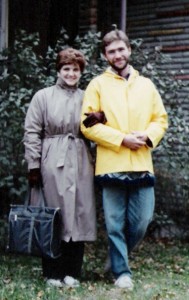Miles Davis’s tune “So What,” on his 1959 recording, Kind of Blue, has clearly won the designation as a jazz “classic.” Indeed, I could easily have written, “his classic 1959 recording, Kind of Blue,” and virtually anyone at all familiar with jazz music would unhesitatingly recognize the truth of this.
The fact that this tune is a “classic” means, among other things, that the tune has near-universal appeal: it is quite a safe bet that virtually anyone hearing this song (anyone with a basic familiarity with Western music, anyway) will find it immediately appealing and expressive of a specific, and quite compelling, atmosphere. The tune, in short, has captured something like a universal feeling, and listening to the tune is like visiting an identifiable place on the map of the human soul.
This, in general, is how the pieces we come to identify as important works of art operate. Artwork—a single work of painting or architecture, or, more commonly, a movement realized through many works and many media—captures something about the experience of being a person, and, by expressing this, it allows us to see something essential about ourselves, typically for the first time.  Art is like mirror, but a creative mirror: creating the “reflection” that this mirror provides comes first, allowing us subsequently to recognize ourselves therein. We feel, with the artwork, that we are finally able to see or say something important that was otherwise lying unacknowledged. Having now been expressed, however, an essential aspect of our reality is permanently available to all.
Art is like mirror, but a creative mirror: creating the “reflection” that this mirror provides comes first, allowing us subsequently to recognize ourselves therein. We feel, with the artwork, that we are finally able to see or say something important that was otherwise lying unacknowledged. Having now been expressed, however, an essential aspect of our reality is permanently available to all.
When we relate to a great work, it is this universal appeal, this creative human mirroring, that we are most likely to notice. This “eternal” message of the work, however, is not all there is to notice.
There is a date attached to the recording of Kind of Blue: 1959. In fact, the date is even more precise: March 2, 1959. We call this a musical recording, and what is recorded are the activities of 6 individuals in a particular room (at 207 E. 30th Street in Manhattan) at a particular time on that day. When you listen to “So What,” you hear something universal and eternal, but you are also hearing a very specific historical event. You are hearing what those guys did in that place on that day.
 Family photographs record the activities of parents and children at the beach or at the Christmas party, and we typically rely upon them to be a kind of memory of the events of our past. When we look at a family photograph, we typically do not look for a universal meaning, but instead look to them as memorials of human particularity, (though we can shift our perspective to find artistic worth in the personal photographs we otherwise look to only as record-keepers; see, for example, http://borrowed-memories.blogspot.ca/). Typically, attending to memory is not how we listen to musical recordings, but we can: we hear in these recordings their universal meaning, but they, too, are memorials to the long-past actions of particular individuals.
Family photographs record the activities of parents and children at the beach or at the Christmas party, and we typically rely upon them to be a kind of memory of the events of our past. When we look at a family photograph, we typically do not look for a universal meaning, but instead look to them as memorials of human particularity, (though we can shift our perspective to find artistic worth in the personal photographs we otherwise look to only as record-keepers; see, for example, http://borrowed-memories.blogspot.ca/). Typically, attending to memory is not how we listen to musical recordings, but we can: we hear in these recordings their universal meaning, but they, too, are memorials to the long-past actions of particular individuals.
We can love the music of a great recording, but, it seems to me, the impact of the recording is even greater if we hear it as the memorial of a singular event. If we hear “So What,” for example, as something 6 men did on that day, and we ask ourselves again, “What am I hearing?” we hear something amazing: we hear people, in the finite time of their mortal lives, (and, indeed, all but one of those 6 men, the drummer Jimmy Cobb, have since died), wrestling with the infinite, grasping and realizing for us all an immortal significance through their particular, temporal practice.
This is how the great Athenian historian, Thucydides, described his own project in writing his history of the Peloponnesian War: he sought to produce a “possession for all time.” The size of his accomplishment is, in fact, staggering. Recording military and political events in 5th-Century B.C. Hellas as they transpired, simultaneously he preserved for us the memory of particular actions, cast through his narrating into a meaningful form they would not otherwise have had, he provided a meaningful interpretation of human, political life that has the eternal capacity to educate us about our own condition, and he effectively invented the practice of writing history, thereby transforming forever the possibilities for human self-interpretation.
Whether in the “modal” revolution of 1959 recording session of Miles Davis’s sextet, in the shore temples of Mahabalipuram, in the history of Thucydides, or in the forgotten family photo, we have the memorial of the distinctive nature of humanity: in our mortality, we are the finite site for witnessing to the absolute.


 Participants in these
seminars consistently have the experience of growth in their conversation and
conceptual abilities, and typically leave with a transformed sense of the nature
and possibilities of philosophy.
Participants in these
seminars consistently have the experience of growth in their conversation and
conceptual abilities, and typically leave with a transformed sense of the nature
and possibilities of philosophy.





2 Comments
“we are the finite site for witnessing to the absolute”, or we are that whereby the Absolute catches sight of itself! ( ;
This post made me think about how practices and traditions offer to us predetermined set of behavior that themselves set the stage for meaningful and spontaneous human interactions. It’s nice think about human practices as sites of meaningful human interaction, as well as sites for witnessing the absolute.